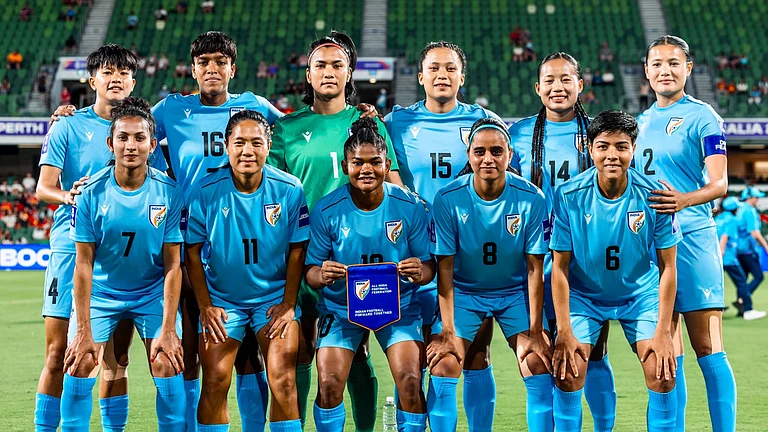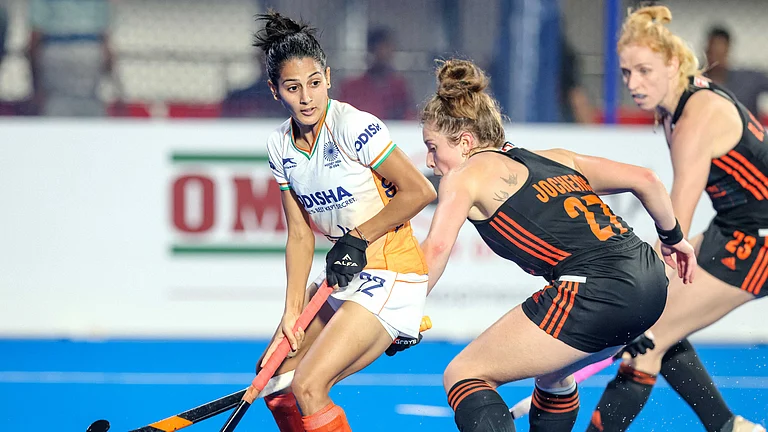Forget women becoming chief ministers, in Himachal Pradesh, women's representation in state politics, whether within the assembly or outside, is continuously diminishing. This became clear when at least two women – Vidya Stokes and Pratibha Singh – tried to stake claims but failed.
The trend, says former PCC president and two-time Rajya Sabha member Viplove Thakur, speaks volumes about ‘male chauvinism’. It is a reflection of a deep-rooted patriarchal society, despite women having proved that they can outshine men in every field and in nation-building. There is much difference between what is said and delivered by the parties, she says.
“In one of the international conferences on women's empowerment I participated in as a sitting MP, I said celebrating Women’s Day has no meaning. We should rather organise such conferences for men to change their mindset about women,” she told Outlook. She even recalled having reminded the Chairman of Rajya Sabha M Venkaiah Naidu as to why there were no women on the panel of presiding officers of the Upper House. Eventually, it was done after her plea.
An example in question is the Himachal Pradesh Assembly, which has just one MLA in the 68-member House even as the state saw the highest turnout of women voters at 76.8 per cent, against 72.4 per cent of males.
Congress won the November 12 assembly election, winning 40 assembly seats. But not even a single woman MLA was elected. This is the first time since 1967 that there is no cabinet representation for women.
Sukhwinder Singh Sukhu, who emerged as the chief minister, admitted it to be a piquant situation when none of the three women candidates fielded by the Congress could win the election. “I would have been too happy to keep a slot for women ministers but there were none elected,” he says.
Sukhu had faced opposition to his name by Pratibha Singh, PCC president and sitting MP from Mandi. She tried to push her claim to the chief ministerial post on the “legacy” card, being the wife of former chief minister Virbhadra Singh on whose name the Congress fought the polls.
The party high command preferred Sukhu over Pratibha Singh and also another contender – Mukesh Agnihotri (now Deputy CM) – as he had the support of maximum MLAs. Pratibha Singh, not being an MLA, was disadvantaged as she could not muster the support of a larger group in the Congress Legislature Party. Additionally, Sukhu enjoyed the backing of Rahul Gandhi and Priyanka Gandhi.
Pratibha Singh certainly carved out her place in politics by winning the Mandi by-poll in 2021, which set the tone for the Congress victory march after the November 2022 polls. However, she certainly needs her 'acceptability' in the party and masses.
The problem remains that the Congress, despite its solemn promise to field women as one-third of all candidates, eventually gave them just three tickets. The biggest blow was the defeat of six-time MLA Asha Kumari losing her Dalhousie seat to the BJP. She too was a name seen in the chief ministerial bracket.
The BJP also disappointed women by allotting only six tickets – almost the same as the Aam Aadmi Party, which made its debut in the Himachal Pradesh poll. Luckily enough, BJP’s Reena Kashyap, a sitting MLA of the scheduled caste reserved seat of Pachhad, won.
There were a total of 24 women candidates in the fray this time.
“I find myself quite fortunate to be the women's voice in the House. I don’t see myself alone and will make my voice heard in the 68-member House,” Kashyap says, admitting that the party needs to do more to groom women leaders for the future.
In the last state assembly elections, in 2017, four women candidates won and one of them, Sarveen Choudhary, was inducted into the cabinet as a third-term minister.
Ahead of the elections, BJP had made 11 promises for women in its manifesto, under ‘Stree Shakti Sankalp’, announced 33% reservation to women in government jobs and educational institutions, a corpus fund of Rs 500 crore to give interest-free loans to women entrepreneurs, and bicycles and scooters to school and college going girls.
Former chief minister Prem Kumar Dhumal recalls, “During my term, we took a landmark decision to raise women's reservation in Panchayati Raj Institutions from 33 per cent to 50 per cent. This yielded excellent results as a lot more women came forward and contested non-reserved candidates. Their percentage rose to 57-58 per cent”.
There is a perceptible change in the scene since then. The advantage in Himachal Pradesh is the high women's literacy ratio and awareness. Not only in PRIs but women were elected to posts of Zila Parishads. This is very heartening, Dhumal says, strongly favouring the demand for one-third of tickets to women in the state assembly, unlike this time.
Dr (Ms) Aparna Negi of Himachal Pradesh University, who heads the University’s Centre for Women Studies, feels that attitudes have changed in the hilly state. Women in Himachal Pradesh are making their mark in almost every field.
She claims “Young educated women know how to articulate themselves. Their representation in student organisations, even as office-bearers, is very encouraging. I have a lot of hopes that these women will certainly make their place in politics too in the coming years.”
She doesn’t agree with the view that women are denied opportunities, rather she thinks it's a question of whether they are asking for this from the political parties or not. The moment they ask, there is a likelihood of getting it, says Dr Negi, who has done a lot of work on gender sensitisation and organisational gender mainstreaming.
Some of the big names in Himachal Pradesh, who became real role models in the state’s politics include firebrand politician Shyama Sharma, who remained a minister in Shanta Kumar's cabinet; Sarla Sharma, a freedom fighter, minister and PCC president; Vidya Stokes, the veteran politician who served as the senior-most minister and the first woman Speaker. She lost her chief ministerial race to Virbhadra Singh in 2003 due to a lack of support from MLAs that Congress stalwart Virbhadra Singh could muster.
There were names like Satyavati Dang, a Rajya Sabha member who later married Dr Y S Parmar, the first chief minister of the state; Usha Malhotra; Chandresh Kumari, a former Union minister as well as state cabinet minister in Himachal Pradesh; Lata Thakur; Padma Kumari, a member of the royal family and an MLA; Viplove Thakur; Sarveen Choudhary; Urmil Thakur; Bimla Kashayp and Kamlesh Kumari.
Unfortunately, most of the women politicians in Himachal Pradesh have been dynasts who capitalised on family legacies.
Hemlata Verma, Assistant Director at Gender and Adolescents, ICRW, Asia says, "Himachal Pradesh has been a good case study for women empowerment. Not only in politics [but] the women have [also] been at the centre of economic and social developments in the state. Encouraging women's political participation needs to be an intentional process. Not just having them as strong cadres but also in key decision-making positions in the political process if there is gender diversity in the parties and women candidates are not just pitched for tokenist reasons in the elections."
Verma suggests that parties should give space to a new crop of young educated women coming up from Panchayats and Zila Parishads, or urban bodies.
Meanwhile, in the 2022 poll, when former minister Mohinder Singh Thakur, a seven-time MLA, chose to pass on the political legacy to his son Rajat Thakur, who eventually lost the poll, his daughter Vandana Guleria – an active Zila Parishad member – revolted against her father. She took to social media to question why sons are preferred as dynasts in politics over daughters.
She also questioned why women are always treated like sacrificial lambs.






















